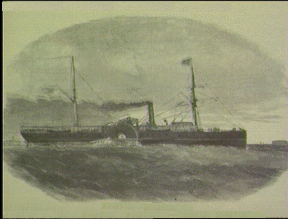![]()

The Star of the West was a side-wheel merchant steamer, which ordinarily made runs between New York and New Orleans. Initially, the formidable sloop of war, Brooklyn, was to carry the troops and supplies to reinforce Fort Sumter. But the Buchanan administration determined against sending a warship as too provocative, too public, and possibly too heavy to make its way into Charleston Harbor. Instead, they chartered the Star of the West for $1250 a day, and, to maintain secrecy, cleared the vessel as usual for New Orleans. Once out of port, the vessel was anchored in darkness and the troops boarded. Both the troops and supplies were to hide below decks as the steamer made its way into the harbor.
The mission proved a military fiasco. No sooner had the Star of the West departed than the president received a message from Major Robert Anderson indicating that he could hold out at Fort Sumter for the foreseeable future. Orders were promptly dispatched to detain the Star of the West, but it had already left. Orders were sent to the Brooklyn to intercept the vessel at Charleston, or to render assistance if needed, but the Star of the West arrived first. Furthermore, the attempt to maintain secrecy failed. Newspapers published stories that the ship was headed for Charleston, and Carolina officials received confirmation from Louis Wigfall, still a United States senator from Texas, as well as from Buchanan's secretary of the interior, Jacob Thompson of Mississippi. At the same time, the official notification of the mission to Anderson at Sumter was trusted to the regular mails and had not arrived when, in the early morning of January 9, 1861, Carolina's batteries opened on the Star of the West. The unarmed ship was caught in a cross-fire. Receiving no assistance from Fort Sumter, it turned back to New York after suffering minor damage.
Although it failed to reinforce Sumter, the Star of the West operation resulted in the resignation of Thompson from the cabinet. It also reflected a stiffening of the Buchanan administration's resolve to uphold the Union against secession.